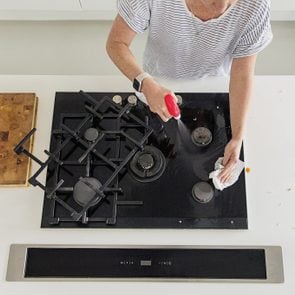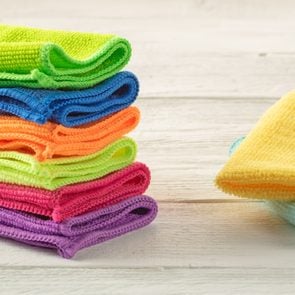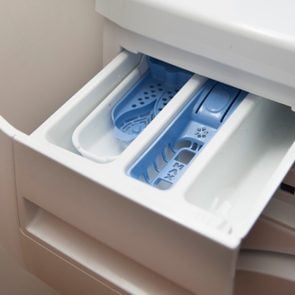9 Natural Cleaners That Get Your Home Sparkling Clean, According to Pros
Updated: Jun. 09, 2024

These eco-friendly DIY cleaning solutions are easy to make, affordable and incredibly effective
Whether you’re looking to use fewer chemicals in your home or want to save money by finding an alternative to pricey commercial cleaning products, you can easily whip up a natural cleaner that really works with just a few basic ingredients. Pantry staples such as vinegar, baking soda, lemons, rubbing alcohol and dish detergent can be used to make homemade cleaning sprays that are effective and safe for every room in your house.
Plus, as an added bonus, not one of these recipes for natural cleaners uses bleach, which, though it is an effective cleaner and disinfectant, can also cause some scary chemical reactions when mixed with other household cleaning products, including ammonia. Also, for safety’s sake, please have a waterproof marker ready for labeling your homemade cleaners and the ingredients they contain as soon as you mix them up. (Most get mixed up in a reusable spray bottle.) These natural cleaners should be effective for up to three months unless otherwise noted.
Reader’s Digest spoke with a slew of cleaning pros, including Melanie Mannarino, an eco-friendly cleaning expert, and Melissa Maker, founder of Clean My Space and MakersClean.com, for the top natural cleaners to get your home sparkling. Read on for the best homemade all-purpose cleaners and more.
Get Reader’s Digest’s Read Up newsletter for more cleaning, humor, travel, tech and fun facts all week long.
About the experts
|
Multipurpose cleaning solution
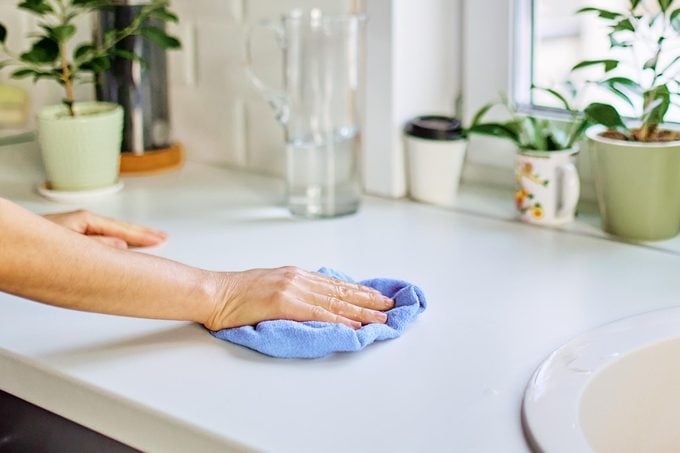
Supplies you’ll need
- 4 ounces of rubbing alcohol
- 6 ounces of distilled white vinegar
- 14 ounces of water
- Spray bottle
- A few drops of essential oil (optional)
Perfect for everyday cleaning all around the house, this can be used on quartz and other types of manufactured (but not stone) countertops, says Mannarino. She also likes it for wiping down fridge shelves and drawers and kitchen faucets and sinks. Pour all three ingredients into a clean, empty spray bottle, then shake well. Customize the scent by adding a few drops of your favorite essential oil. “I love using citrus essential oil when cleaning,” says Mannarino. “It smells so fresh and bright, and to me the scent just smells like ‘clean.’”
Multipurpose bathroom cleaner
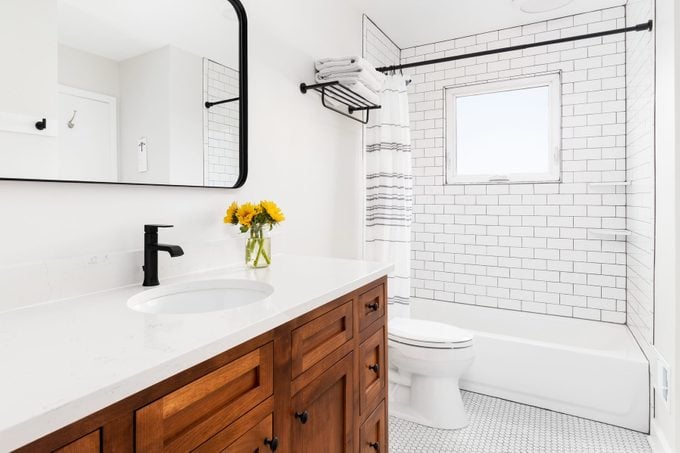
Supplies you’ll need
- 4 ounces of warm water
- 1/4 teaspoon of liquid dish soap (such as Dawn)
- 1 ounce of distilled white vinegar
- Spray bottle
You “don’t have to use chemicals to get your bathroom sparkling clean,” says Jen Stark, home improvement expert and founder of Happy DIY Home. To make this natural cleaner, mix all the ingredients in a spray bottle. To use, simply spray on whatever surface—whether it’s tile, toilet seats or the tub—you’re cleaning then wipe away with a sponge and rinse.
Glass and mirror cleaner
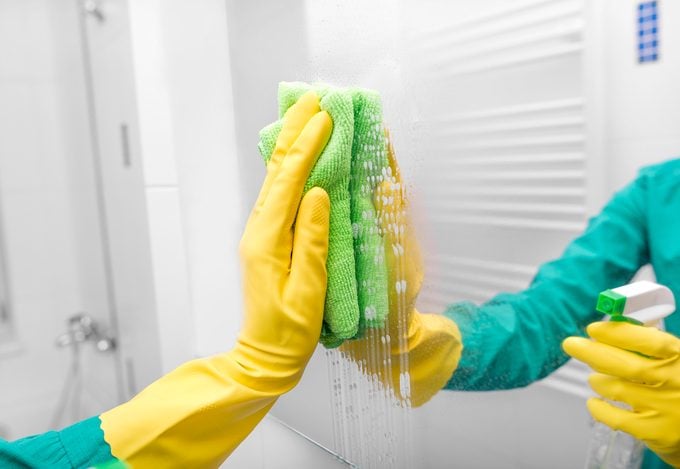
Supplies you’ll need
- 8 ounces of distilled white vinegar
- 8 ounces of water
- Spray bottle
“This works as well as any commercial glass cleaner,” swears Maker. Mix equal parts vinegar and water in a spray bottle. Note: Do not add lemon or any other citrus juice to your glass cleaning spray, because that could leave you with streaky glass and mirrors. For a streak-free shine on windows and mirrors, Mannarino recommends using microfiber cloths.
Mold and mildew remover
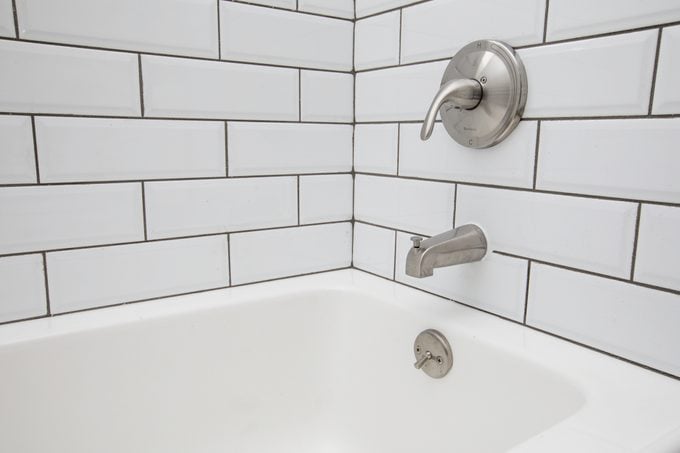
Supplies you’ll need
- 1 cup of 3% hydrogen peroxide
- 2 cups of water
- Spray bottle
Mix the two ingredients in a spray bottle, apply directly to the affected areas and allow it to sit for an hour before wiping clean with a damp cloth. Need a little extra scrubbing power? “Mix a bit of water with baking soda to make a deep-cleaning paste,” says Mannarino. Use an old toothbrush or other scrub brush to apply it to grout and tile, then let sit for a few minutes before scrubbing and rinsing with water. Hydrogen peroxide breaks down quickly, so you’ll want to toss any leftover mixture.
Soap scum remover
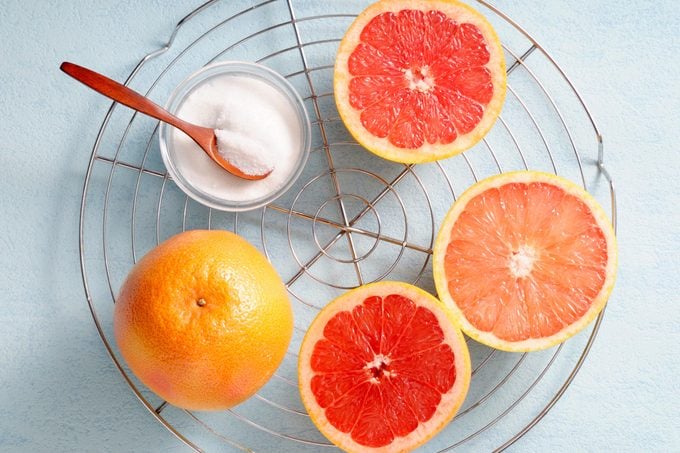
- 1/2 grapefruit
- Kosher salt
Use this soap-scum-removing combo on your bathtub or shower glass, says Mannarino. Simply take half a grapefruit and pour a layer of Kosher salt over the cut side. Then rub the salted grapefruit onto your tub or shower walls, and you’ll see the soap scum start to lift away. When finished, rinse well and toss the grapefruit. “The grapefruit’s citric acid and the coarseness of the salt work together to power through stubborn scum,” says Lauren Bowen, director of franchise operations at Two Maids & A Mop. “Grapefruit is another fresh, zingy citrus scent that conveys ‘clean’ while also getting the job done,” adds Mannarino.
Regular drain maintenance cleaner
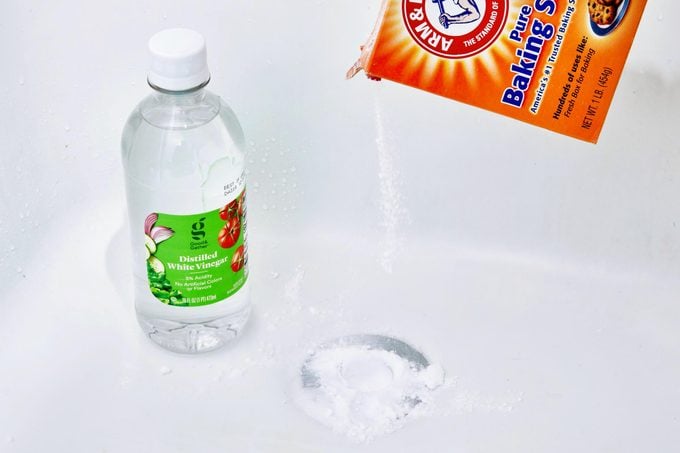
Supplies you’ll need
- 1/2 cup of baking soda
- 1/2 cup of distilled white vinegar
Pour these two ingredients down the drain you wish to clean, and let it sit for an hour before flushing with boiling water. “Trust the process—the vinegar and baking soda should loosen soap scum and other nasties clogging your drain,” says Mannarino. “You may or may not see some fizzing when you first add the vinegar and baking soda to your sink. Either way, know that it’s working and you will see the results afterward when water drains more easily,”
Oven cleaner
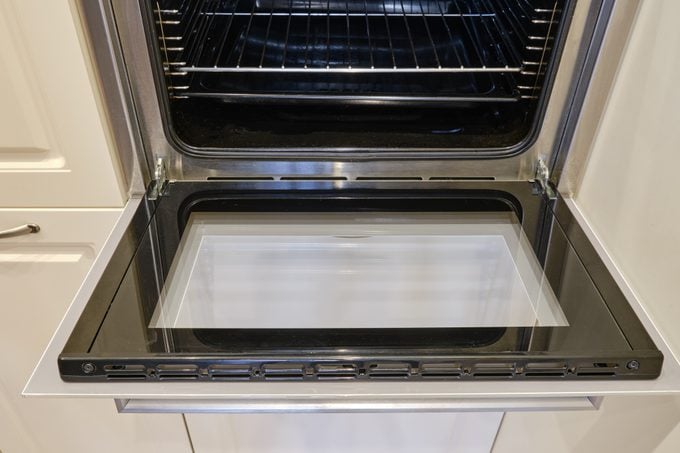
Supplies you’ll need
- 1/2 cup of baking soda
- 2 to 3 tablespoons of water
Commercial oven cleaners are by nature laden with powerful chemicals. To make a natural oven cleaner, combine the baking soda with just enough water in a bowl to make a paste. Wearing rubber gloves take out the removable racks and wipe out any large debris that you see. Next, spread the paste over the interior surfaces of the oven, avoiding the heating elements. Allow to sit overnight, and then wipe down with a damp cloth.
Microwave cleaner
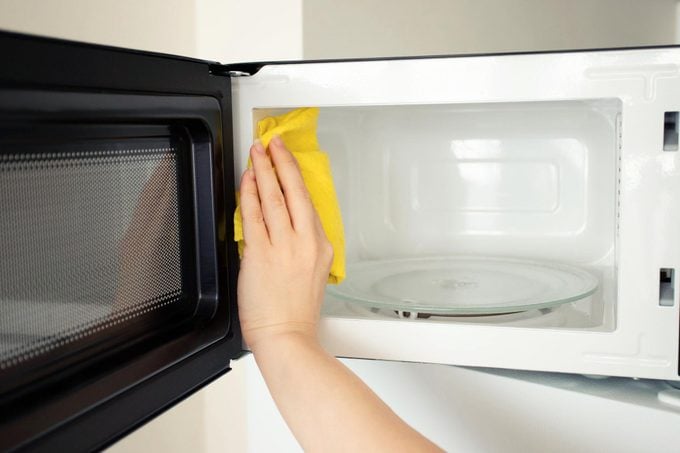
Supplies you’ll need
- 1/4 cup of distilled white vinegar
- 1/2 cup of water
- 1 tablespoon of vanilla extract
Mix this solution in a microwave-safe bowl, and heat on high for 30 seconds. Carefully remove the bowl, then wipe down your microwave oven’s interior. You should be able to wipe away any debris with ease, and the vanilla extract will leave a fresh scent. “The leftover food should wipe away with ease and leave a clean, fresh-baked cookie scent,” says Ron Shimek, president of repair experts at Mr. Appliance.
Window blinds cleaner
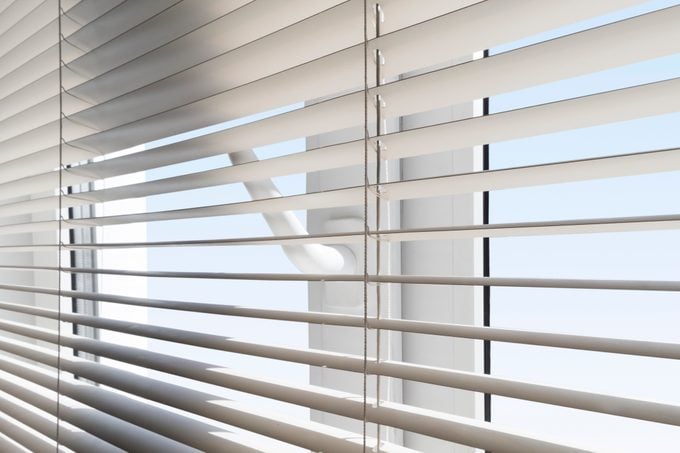
Supplies you’ll need
- 1 cup of water
- 1 cup of vinegar
Combine the two ingredients in a spray bottle, then spray on a microfiber cloth and wipe down both sides of your closed blinds.
FAQs
What is the best natural cleaning agent?
“I love white vinegar, but for most jobs, you have to make sure it’s diluted with equal parts water,” says Mannarino. “I use it at full strength to remove hard-water stains on and around faucets, sinks and bathtubs.” But, she does caution that it doesn’t work on everything—vinegar can damage natural-stone countertops, waxed wood floors and rubber, such as the rubber around your dishwasher or oven door.
Do natural cleaners really work?
Absolutely, says Mannarino. “You might need to use a little more elbow grease or a scrub brush, but in most cases, all you need is your natural cleaner and a slightly damp cloth.”
Why trust us
At Reader’s Digest, we’re committed to producing high-quality content by writers with expertise and experience in their field, in consultation with relevant, qualified experts. For this piece, we relied on reputable primary sources, including five cleaning professionals. Then Ann Russell, TikTok’s “cleaning auntie” and the author of How to Clean Everything, gave it a rigorous review to ensure that all information is accurate and offers the best possible advice to readers. For this piece, we relied on reputable primary sources, including cleaning and faucet experts and reputable organizations. We verified all facts and data and backed them with credible sourcing, and we will revisit them over time to ensure they remain accurate and up to date. Read more about our team, our contributors and our editorial policies.
Sources:
- Melanie Mannarino, award-winning journalist, eco-friendly lifestyle expert and author of The (Almost) Zero-Waste Guide: 100+ Tips for Reducing Your Waste Without Changing Your Life; email interview, Jan. 11, 2024
- Melissa Maker, cleaning expert for over 17 years and founder of Clean My Space and MakersClean.com; phone interview, Feb. 14, 2024
- Jen Stark, founder of Happy DIY Home; interviewed July 2021
- Lauren Bowen, director of franchise operations at Two Maids & A Mop; interviewed July 2021
- Ron Shimek, president of repair experts at Mr. Appliance; interviewed July 2021





















